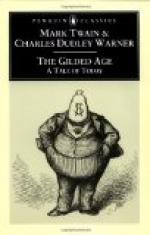about again tomorrow or next day, a friend tells me. A bold
onslaught is worth trying. Go for a suspension of the rules! You
will find we can swing a two-thirds vote—I am perfectly satisfied
of it. The Lord’s truth will prevail.
“Dilworthy.”
Mr. Buckstone had reported the bills from his committee, one by one, leaving the bill to the last. When the House had voted upon the acceptance or rejection of the report upon all but it, and the question now being upon its disposal—Mr. Buckstone begged that the House would give its attention to a few remarks which he desired to make. His committee had instructed him to report the bill favorably; he wished to explain the nature of the measure, and thus justify the committee’s action; the hostility roused by the press would then disappear, and the bill would shine forth in its true and noble character. He said that its provisions were simple. It incorporated the Knobs Industrial University, locating it in East Tennessee, declaring it open to all persons without distinction of sex, color or religion, and committing its management to a board of perpetual trustees, with power to fill vacancies in their own number. It provided for the erection of certain buildings for the University, dormitories, lecture-halls, museums, libraries, laboratories, work-shops, furnaces, and mills. It provided also for the purchase of sixty-five thousand acres of land, (fully described) for the purposes of the University, in the Knobs of East Tennessee. And it appropriated [blank] dollars for the purchase of the Land, which should be the property of the national trustees in trust for the uses named.
Every effort had been made to secure the refusal of the whole amount of the property of the Hawkins heirs in the Knobs, some seventy-five thousand acres Mr. Buckstone said. But Mr. Washington Hawkins (one of the heirs) objected. He was, indeed, very reluctant to sell any part of the land at any price; and indeed—this reluctance was justifiable when one considers how constantly and how greatly the property is rising in value.
What the South needed, continued Mr. Buckstone, was skilled labor. Without that it would be unable to develop its mines, build its roads, work to advantage and without great waste its fruitful land, establish manufactures or enter upon a prosperous industrial career. Its laborers were almost altogether unskilled. Change them into intelligent, trained workmen, and you increased at once the capital, the resources of the entire south, which would enter upon a prosperity hitherto unknown. In five years the increase in local wealth would not only reimburse the government for the outlay in this appropriation, but pour untold wealth into the treasury.




